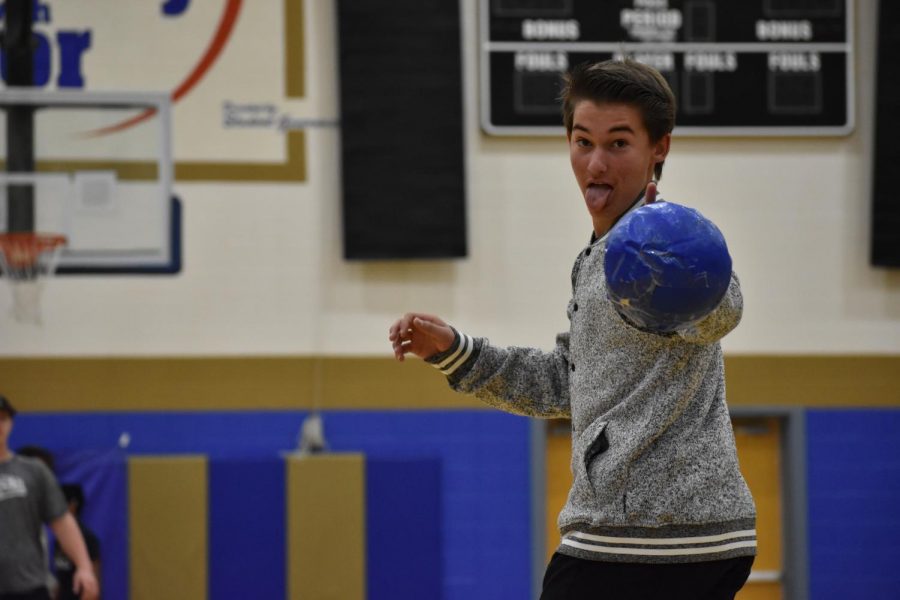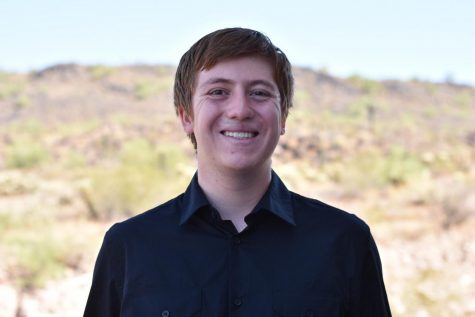S.W.A.T ushers in new activities for students
Levi Meyer, sophomore, taunts opponents in kickball
January 12, 2018
With finals, standardized tests, college applications, and homework, stress runs rampant across any school community, which can lead to both obesity and depression. A new face on campus hopes to ensure students are physically active, healthy and mindful so that high school is an experience for them to remember without these demons weighing them down.
S.W.A.T (Student Wellness Advocacy Team) is a new club which seeks to promote physical, nutritional, and mental wellness across campus and the community. Eagle Hour has served as the groundwork for the activities of this program, which occur during either the first or second half.
Shane Hesse, health teacher, Melissa Portela and Jennifer Guerrette, sports medicine teachers, are the facilitators of S.W.A.T and founded it based off the very real fear of illness striking more young people.
“The statistics show that your age group is going to have a 5-10 year shorter lifespan than the adults of today and that’s based on nutrition, physical activity, and stress management,” Hesse said. “Statistics also state that one in three children born after the year 2000 will have type two diabetes by the time they’re 18, those two things really hit home with me personally since I have kids.”
Due to these alarming facts, Hesse has strove to embed wellness into OHS as a culture of its own, which he says will increase the overall happiness and productivity of the school.
“I think we can create a culture on campus through health and wellness that will reach our teachers and students to become more engaged in the classroom,” Hesse said. “If our students are more healthy and active and our staff is more healthy and active, then that leads to better productivity, less stress and less chronic disease.”
Long term health for students is also a goal emphasized by Phaelen Bride, freshman and president of S.W.A.T.
“It’s important because it will make the students more active and healthy so they don’t have more health problems later on,” Bride said.
The three aspects of wellness S.W.A.T strives to teach students are Physical, Mental and Nutritional. Physical wellness is seen with activities during Eagle Hour such as basketball, tug-of-war, dodgeball, and many more.
Mental wellness and mindfulness is a lesser-known aspect of wellness that Hesse wants to teach to the community and develop even more further down the road.
“They say you should have 60 minutes of physical activity every day, that’s the 2008 physical activity guidelines that were produced, but they also say you should have 60 minutes of mindfulness each day and that’s really just being present with yourself and that could be many different modalities but for some people that’s their escape, they meditate, they don’t really have outside pressures,” Hesse said.
One form of mindfulness is art therapy, which is a form of therapy that uses artistic creative processes to improve one’s mental wellness. S.W.A.T plans to work with Dena Davis, art teacher, to implement art therapy as an activity that will boost students’ mindfulness.
Veronica Elton, swim coach, is planning on doing a monthly nutrition course for the nutritional aspect of wellness, and Melanie Britton, band instructor, is planning a monthly hearing wellness course. Phaelen Bride, freshman and S.W.A.T president, also wants to implement more healthy food onto campus next semester, such as Cafe Zupa’s, for the nutritional aspect.
With the variety of mindful and physical activities on campus, Hesse says this provides students a window into their college lives and an overall boost of happiness and confidence.
“I think (students) are going to gain a sense of college, you’re bringing intramurals and activities throughout the day and (if) you walk on ASU that’s what you see,” Hesse said. “They’re going to gain a better physical and mental state personally, and then professionally it will translate to their academics. If you could come to campus and be excited everyday, whether you’re a teacher or a student, that’s what we’re here for.”
S.W.A.T just recently won the gold award for the Healthy Arizona Worksight Program, and scored $1,000 from a local outing of Shark Tank from pitching the idea of a meditation room in the library, filled with yoga mats and TVs for students and staff to relax in. S.W.A.T hopes to simply expand on the awards they’ve already received even more.
“Next semester our HAWP team is going to try and go for Platinum,” Bride said.
Hoping to make a change and promote wellness across the community, S.W.A.T is a new face on campus who has a long road ahead of them, but a culture of wellness and academic progress can be created if students and staff put in the same time and effort.
“Wellness is sustainable on campus and in our community,” Hesse said. “If we could have students who feel the same way in our community then it really translates into the classroom of just a better all-around environment, better academics and better happiness with students and staff who want to be here.”






